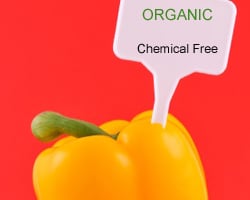
If you are like most Americans, your morning routine probably looks like this:
You shower and wash your face with fragranced, anti-bacterial wash; shampoo with sodium laureth sulfate and salicylate derivatives; brush your teeth with fluoridated, flavored toothpaste; rinse with mouthwash containing thymol; eat cereal containing refined sugars and artificial colorings along with milk derived from hormone-fed cows; and expose your body to hundreds of other household chemicals.
For many of us, questions still remain. Why choosing natural and organic products can have a direct impact on me, and my family’s, overall health? When can I begin to make natural and organic purchasing decisions? How do I begin? Education and awareness is the beginning of change. By making informed choices, you can protect yourself and your family in the long run. Educating yourself, and your loved ones, about the products you eat and use on a daily basis can help make a huge difference in your overall health and environment.
Humans emerged approximately 40,000 years ago. At that time we lived in a natural environment and ate a “hunter-gatherer” diet based on foods coming directly from the earth such as wild game and indigenous plants. Although most of us no longer eat a “hunter-gatherer” diet, it still has some validity on what and how humans are supposed to eat.
The 20th century produced enormous changes in the production, preservation, and storage of food. Human consciousness has made tremendous social, scientific and intellectual strides. However, physically, humans are still intended to eat natural foods, not foods preserved for a five-year shelf-life. As the information about the relationship between food, the environment and human health increases, people are realizing that a “natural health” lifestyle is not merely a fad, but a priority. Today the term “natural health” refers to a lifestyle where one uses and consumes natural and organic products.
“Natural health” products do not contain harmful preservatives, food coloring, harsh chemicals, growth hormones and/or pesticides, all of which have been linked to degenerative diseases such as cancer, heart disease and diabetes. It is known that there are over 10,000 food additives, preservatives, and colorings, most of which are synthetic, in our food supply today. They are used to enhance taste, prolong shelf life and alter the color or nutritional value of the product. The term “natural food” – once used to describe unadulterated fruits and vegetables, unrefined grains, and wild game – has expanded to include packaged, processed foods containing a variety of chemicals. The word “natural” seems to appear everywhere these days from cereal boxes, to soup cans, to ice-cream containers. In the strictest sense of the word, any food found in a package cannot be “natural”.
Eating “natural food” should mean ingesting food as close to nature as possible. For example, in nature all grains (such as wheat and rye) have three components – bran (fiber), germ and endosperm. When grains are refined, the bran and germ are stripped away leaving only the endosperm, which contains few nutrients. This is the reason nutrition experts recommend eating whole grains since they include all three components – as intended by nature. Removing any one of these components no longer makes the grain “whole”. Eating whole grain breads, pasta and cereal are a step towards a natural foods diet. Buying peanut butter that contains only one essential ingredient, peanuts, is also a step towards a natural foods diet. Usually there is no need to buy products that contain added sugar, partially hydrogenated vegetable oil, salt, or emulsifiers. The simpler a product’s ingredient list is, the better it is for you to eat or use.
The natural health industry is growing rapidly. Over the past decade, sales of organic foods have grown almost 20% annually. In comparison, sales of conventional foods have grown only 2-3% each year. Nearly two-thirds of Americans bought organic foods and beverages in 2005 despite higher costs.
It’s not surprising that rising interest in natural and organic food threatens processed food companies. Consequently, processed food manufacturers want us to believe the natural food industry is based on hype and propaganda. Critics against natural health argue we are wasting our money, and proponents of natural foods are being called “hysterical”. This struggle creates misinformation and confusion for the consumer.
Bottom line, use your judgment. Become educated about your options and mindful of what you put in, and around, your body every day. Don’t believe the advertising on the package of a product – read the ingredients label. Look for products that contain a minimum amount of ingredients. If unrecognizable words or ingredients that sound like chemicals appear on the label, it’s probably not natural.
http://en.wikipedia.org/wiki/Organic_food
Whole Foods lists dangerous ingredients commonly found in foods and other products: http://www.wholefoodsmarket.com/products/unacceptable-ingredients.php
For information about the USDA’s National Organic Program visit:
http://www.ams.usda.gov/nop/indexIE.htm
For feedback about the USDA’s Organic program:
http://www.edenfoods.com/issues_important.html
http://www.nmisolutions.com/










